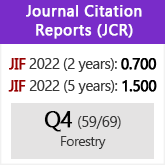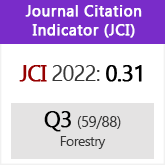Short-term effects of low-intensity prescribed fire on ground-dwelling invertebrates in a Canarian pine forest
Abstract
The effects of prescribed fire on the forest upper ground layer can have consequences for invertebrate communities. Prescribed fire is starting to be used in the Canary Islands as a tool to reduce wildfire risk, but the impacts of this management practice on the Canarian pine forest have not been investigated. The aim of this study is to explore the short-term effects of prescribed burning on the most abundant groups of ground-dwelling invertebrates. Three of six plots were randomly burn and the other three were used as controls. Pitfall trapping was used to collect the ground-dwelling invertebrates four months after burning. No differences were found in total richness, diversity, evenness and total abundance between treatments. Only Psocopteran abundance increased after fire. Litter depth, total vegetation cover and decayed wood cover were different between treatments. Canonical Correspondence Analyses (CCA) revealed differences in species composition between treatments using these environmental variables. It is concluded that the use of low-intensity prescribed burning in this stand did not have an important impact on the structural parameters of the ground-dwelling invertebrate community, but species composition changed. Care shoud be taken with valuable endemic, rare or sensible species.Downloads
© CSIC. Manuscripts published in both the printed and online versions of this Journal are the property of Consejo Superior de Investigaciones Científicas, and quoting this source is a requirement for any partial or full reproduction.
All contents of this electronic edition, except where otherwise noted, are distributed under a “Creative Commons Attribution 4.0 International” (CC BY 4.0) License. You may read here the basic information and the legal text of the license. The indication of the CC BY 4.0 License must be expressly stated in this way when necessary.
Self-archiving in repositories, personal webpages or similar, of any version other than the published by the Editor, is not allowed.















